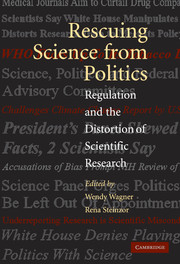Book contents
Conclusion: The Imperative of the Principles
Published online by Cambridge University Press: 04 August 2010
Summary
Science for the Future
Over the next several years, our society will be forced to confront the implications of evidence that human activities are causing the earth's climate to change, as well as dire predictions that oil will run out in less than a century. Debates will continue over the toxicity of ubiquitous pollutants such as mercury, the damage caused by nutrient loading of surface water, the use of scarce potable water resources, and the disruption of ecological patterns such as sharp decreases in the worldwide population of amphibians. It is difficult to think of a time in U.S. history when we have needed science more.
Yet essential science does not always reach the policy makers who must confront these important and difficult problems. The preceding twelve chapters of this book document the multiple ways that science is withheld, compromised, and distorted in the legislative, judicial, and regulatory arenas, with affected parties working overtime to ensure that contradictory data do not defeat their causes. Not only do these activities impose artificial limits on the supply of reliable research, they prevent science from informing policies designed to protect public health and natural resources.
This conclusion considers a series of reforms that would ameliorate the worst abuses. Once again, these proposals are informed by the principles of independent, disinterested, and transparent science that should be accepted as fundamental and incontrovertible by all participants in the debates:
Independence: Scientists must be able to conduct research without unjustified restrictions, including undue influence from research sponsors.
[…]
- Type
- Chapter
- Information
- Rescuing Science from PoliticsRegulation and the Distortion of Scientific Research, pp. 281 - 298Publisher: Cambridge University PressPrint publication year: 2006
- 1
- Cited by

